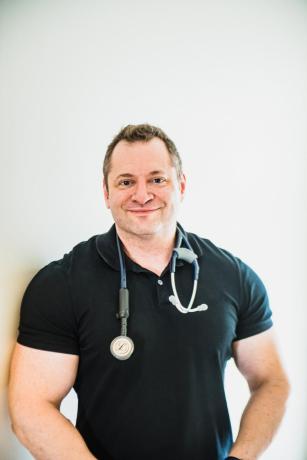- Managing your Practice
-
- Your Benefits
-

Introducing the ultimate Club MD experience
From work to play, and everything in between, we provide you with access to hundreds of deals from recognizable, best-in-class brands, elevating every facet of your life – from practice supports to entertainment, restaurants, electronics, travel, health and wellness, and more. Your Club MD membership ensures that these deals are exclusive to you, eliminating the need to search or negotiate.
Welcome to the ultimate Club MD experience. Your membership, your choices, your journey.
-
- Advocacy & Policy
-
- Collaboration
- News & Events
-

Stay Informed
Stay up to date with important information that impacts the profession and your practice. Doctors of BC provides a range of newsletters that target areas of interest to you.
Subscribe to the President's Letter
Subscribe to Newsletters
-
- About Us
-
Dr Jaron Easterbrook – Communicator, community physician, newest member of GPSC
June 3, 2021
Doctors Making a Difference
After 10 years working as a senior leader in the fields of marketing and product management in the IT world, Dr Jaron Easterbrook took a break to consider his next career move. He would take his new puppy out to a nearby Victoria park and chat with people asking them about their careers, searching for inspiration. One day, he met an ICU doctor.
“He said, have you thought about medicine? Come spend the day with me,” recalls Dr Easterbrook with a smile. “I did and I had a blast. I worked for a year at Royal Jubilee Hospital as a volunteer, went back to complete grade 12 biology online, and got accepted into medical school.”
 Fast forward to today. After 2 ½ years as a family doctor in Victoria, he has just started a new practice in Sidney, BC consisting of four physicians, two nurses, and four medical office assistants. Team-based care has changed the way he works. “It’s allowed me to practice at top of my scope, and it allows patients to get more attention. Especially during the pandemic it has felt that I’m losing that connection with my patients. As a society we need to figure that out—what should be patients’ appropriate expectation of their relationship with their primary care expert. Maybe I’m the subject matter expert, and the team focuses more on day-to-do access. These are the kinds of questions we need to consider.”
Fast forward to today. After 2 ½ years as a family doctor in Victoria, he has just started a new practice in Sidney, BC consisting of four physicians, two nurses, and four medical office assistants. Team-based care has changed the way he works. “It’s allowed me to practice at top of my scope, and it allows patients to get more attention. Especially during the pandemic it has felt that I’m losing that connection with my patients. As a society we need to figure that out—what should be patients’ appropriate expectation of their relationship with their primary care expert. Maybe I’m the subject matter expert, and the team focuses more on day-to-do access. These are the kinds of questions we need to consider.”
Having trained in a team-based model of care, Dr Easterbrook became involved in working with the South Island Division of Family Practice in support of primary care networks. It was when the pandemic hit BC that he was really able to maximize his marketing experience as a senior manager at Apple and Canada Health Infoway to support doctors in Greater Victoria to navigate the unprecedented challenge before them.
He and Dr Aaron Childs became co-chairs of the Greater Victoria COVID-19 Community Task Group, working closely with Island Health to provide guidance and clarity in the midst of a “fire-hose” of information that was being sent to the profession at the time. One example of the group’s leadership was the creation of The Doctor Is In a report that provided much needed advice, grounded in science and best business practice, to help doctors around the province re-open their offices to in-person care after doing largely virtual care for months.
The success of the task group, says Dr Easterbrook, came down to three essential things: recognizing the value and importance of grassroots physicians, maximizing flexibility and constant communications to get timely results, and focussing on maintaining positive relationships—getting the right people around the table from local divisions and the health authority so that decisions could be made then and there.
Dr Easterbrook brings these skills and experiences with him as the newest member of the GPSC. And of course, he brings his vast experience in communications and marketing.
“Communications is incredibly important, it’s how we survive as a species as we’re learning during COVID. If you look at humanity’s major failings, they typically stem from a failure to communicate properly. When there are multiple players, it’s not just what you say, it’s how others receive it. Whether that’s one to one, a newsletter, or in communications to the public, it is incredibly important because how people interpret things is not exactly the way you present them. Success rides on appropriate interpretation.”
When an opening came up for a physician at the General Practice Services Committee, Dr Easterbrook jumped in.
“I have a fundamental belief that – if we’re going to do something – then let’s make it better for others,” he says. “I’ve come to realize over the years that I have a skill set when it comes to systems change and connecting people across different organizations. That’s what I see in what I can bring to GPSC, that connection between disparate groups to work in a way that moves us “out of the box.” There are a lot of smart people out there—let’s help them do what they need to in order to move family medicine forward in BC.”




